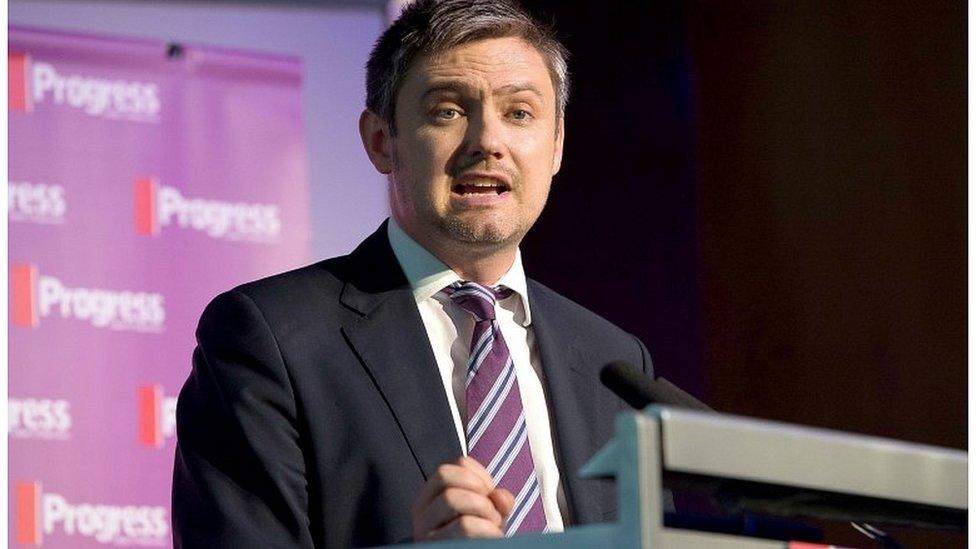Frank Field is not leading a Labour breakaway
- Published
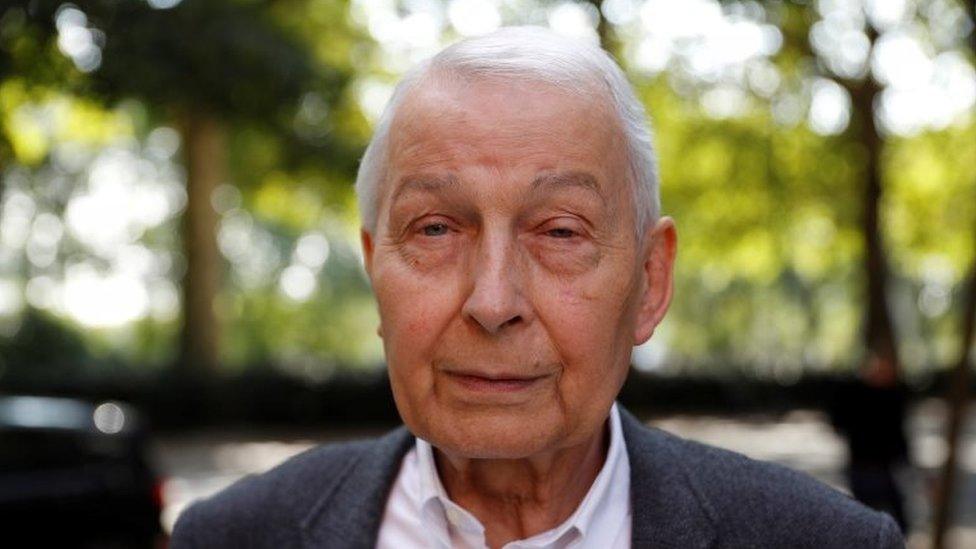
Every avalanche, it is said, starts with a single pebble, and in Westminster terms, Frank Field is a pretty hefty pebble.
The chair of the Work and Pensions Committee is one of Parliament's lone wolves - austere and relentless in a series of policy battles stretching back across the decades.
On the committee corridor at the Palace of Westminster, he is a formidable figure who has savaged the bosses of Carillion and BHS, been a thorn in the side of Gordon Brown and Tony Blair, and, if your memory stretches back across the decades, the scourge of the Maxwell brothers.
So is his departure from the Labour whip the beginning of the much predicted split in the party?
Not by design, anyway.
Mr Field's departure looks very much like a personal decision.
Perhaps the most dangerous aspect for Labour is that he has got unhappy MPs (and there are plenty of them) thinking about their own futures.
There are several factors in play.
First, if the government does manage to get its plans to reduce the number of MPs from 650 to 600 through Parliament - and the final proposed boundaries are expected to be published next week - then something close to a general reselection exercise may follow.
That provides Jeremy Corbyn's supporters with an opportunity to remove those who don't support their leader.
Labour's National Executive Committee (NEC) and the party conference will have to approve a set of rules to deal with that eventuality, and the details of those rules, and the level of protection they afford to sitting MPs will be studied very closely by those who fear they are under threat.
If the rules look like the vehicle for a purge, there will be trouble ahead, and some Labour MPs will calculate they have nothing to lose.
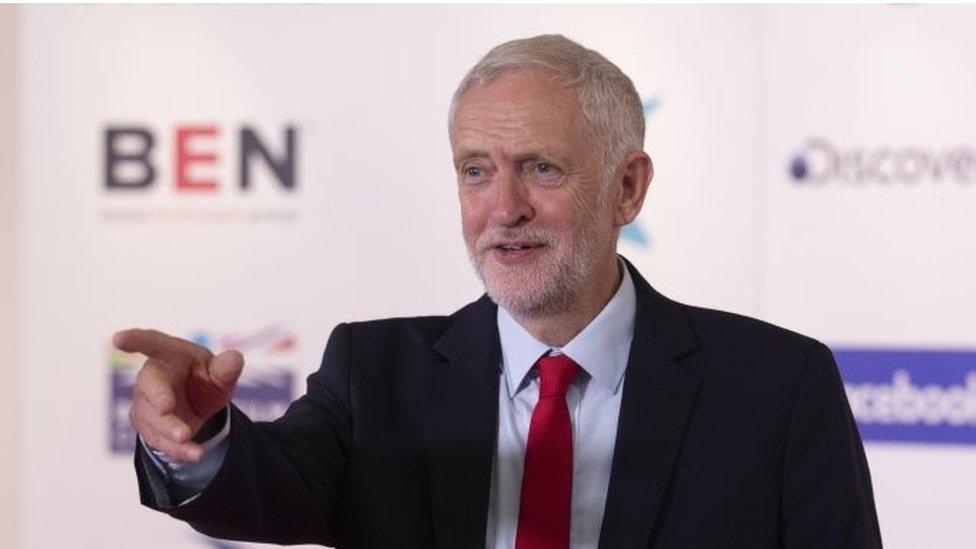
Jeremy Corbyn is hoping to draw a line under the anti-Semitism row
There are also wider concerns about a more general revamp of party structures proposed by the former MP and close Corbyn ally Katy Clark, which would entrench the left's organisational grip.
Then there's Brexit. Some of Mr Corbyn's most vocal internal critics are those who believe Labour should now be campaigning for a second referendum.
They will be loath to upset the applecart while there is a chance of getting organised, cohesive Labour backing behind a Commons vote which could achieve that - and they will be looking to the forthcoming party conference to see if party policy will change, perhaps on the back of union votes.
It follows that they may rethink their position if that vote doesn't materialise and the UK leaves the EU.
On the other side of the coin, the four Labour MPs, Frank Field included, who voted with the government and saved it from defeat in a crucial Brexit vote in the Commons in July, have also taken considerable flak; but there are significant electoral dangers in Labour purging its Brexiteers - remember that the seats Labour lost in 2017 were mostly in Leave-voting areas.
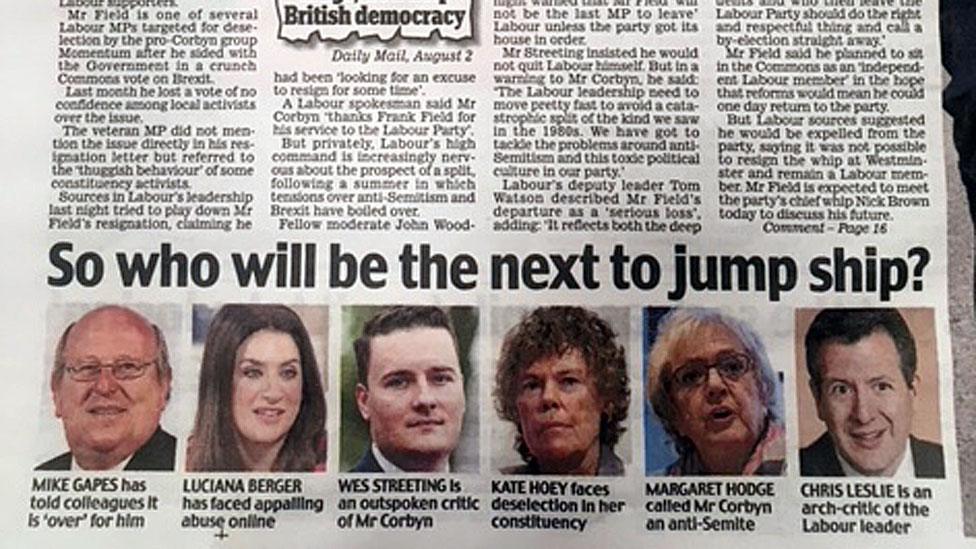
Mr Corbyn's critics are at the centre of press speculation
More dangerous and immediate is the anti-Semitism issue which has dogged Labour through the summer.
Crucial votes on Labour's approach to it take place in the National Executive Committee next week, and then the Parliamentary Labour Party, which might defuse, or detonate the whole issue.
It is hard to understate the level of fury on both sides of this row, which is why it could easily run out of control.
Words have already been spoken which make it hard to imagine the protagonists kissing and making up - but a serious attempt to discipline MPs like Margaret Hodge or Ian Austin, the most vocal critics of Mr Corbyn on this issue, could trigger a walkout by their supporters.
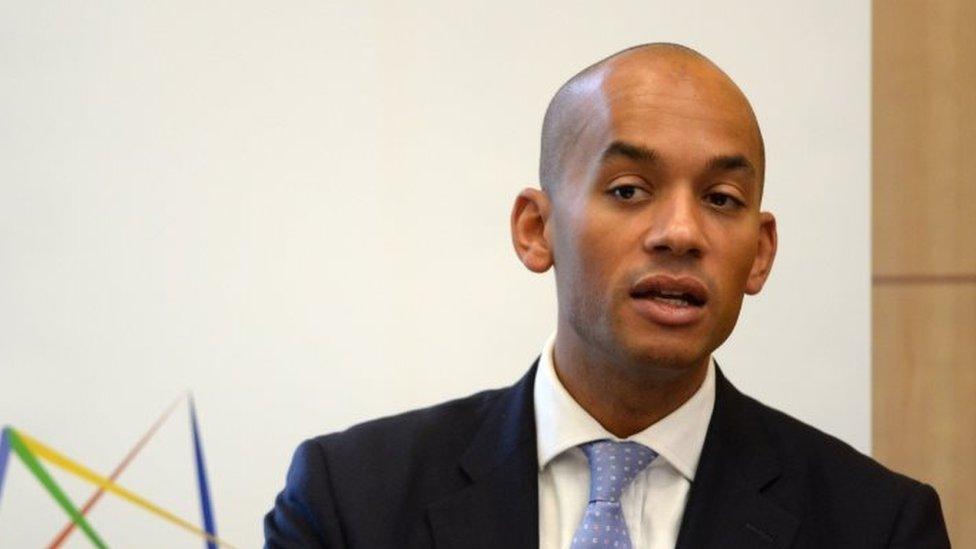
Any new party would have to attract Labour MPs like Chuka Umunna
What is harder to see is how these different strands of dissent could gel into a coherent breakaway.
Take Mr Field. He is not part of any Labour tribe, and he certainly does not fit neatly into the vocal group of Blairite holdouts who are Mr Corbyn's loudest critics.
For a start, reflecting his Birkenhead constituency, he's a Brexiteer, so any idea that he's about to line up with Labour's hardcore Remainers at some grand launch ceremony for a new party is a non-starter.
And this illustrates a wider point; there are plenty of Labour MPs who don't like Mr Corbyn, but they don't necessarily agree on much else.
To work, a new party would have to be more than a lifeboat for shipwrecked careers.
It would need a unifying idea under which a critical mass of activists, as well as MPs, could gather (political parties need infantry as well as generals) and it would certainly need to attract people from beyond the Labour Party.
That would require devising policies which might attract Tory dissidents like Anna Soubry, as well as Labour figures like Chris Leslie or Chuka Umunna.
And such a party would also require leaders, and here there's another problem - if the 1980s SDP is the model, the possible MP defectors include plenty of Bill Rogers types, but no Roy Jenkins, Shirley Williams or David Owen - big, recognisable popular figures.
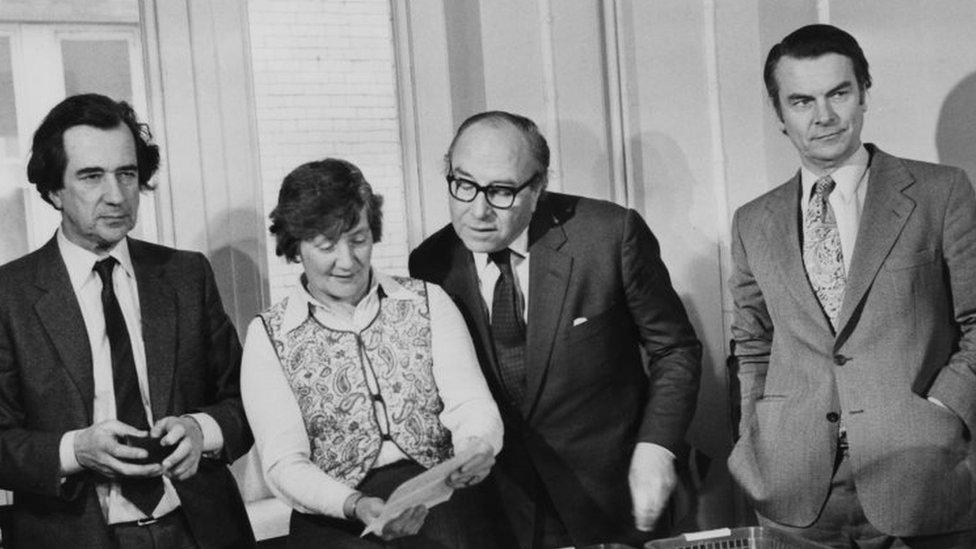
The SDP's gang of four: Bill Rodgers, Shirley Williams, Roy Jenkins and David Owen
My guess is the biggest threat to Labour unity is that the case of Mr Field raises the temperature and the pot starts to boil; that deselection threats escalate and that more and more MPs consider their positions.
Close Corbyn ally Chris Williamson spent the summer pushing for local parties with MPs who are leadership opponents to deselect their incumbents and choose someone more congenial.
Until now, many MPs uncomfortable with the Corbyn leadership have bided their time, but if they sense a real threat to their personal positions - and if the party that nurtured them seems to be changing out of recognition - then the bets may be off.
Political parties are held together by more than ideology - for their members they can be a family tradition and a way of life, providing friendships and social life.
Those links are hard to break, but there is a sense that for many Labour MPs and members, they are fraying.
And across the party divide, the Conservatives, who are developing reselection rumbles and talk of purges of their own, are watching with a combination of opportunism and fear.
- Published31 August 2018
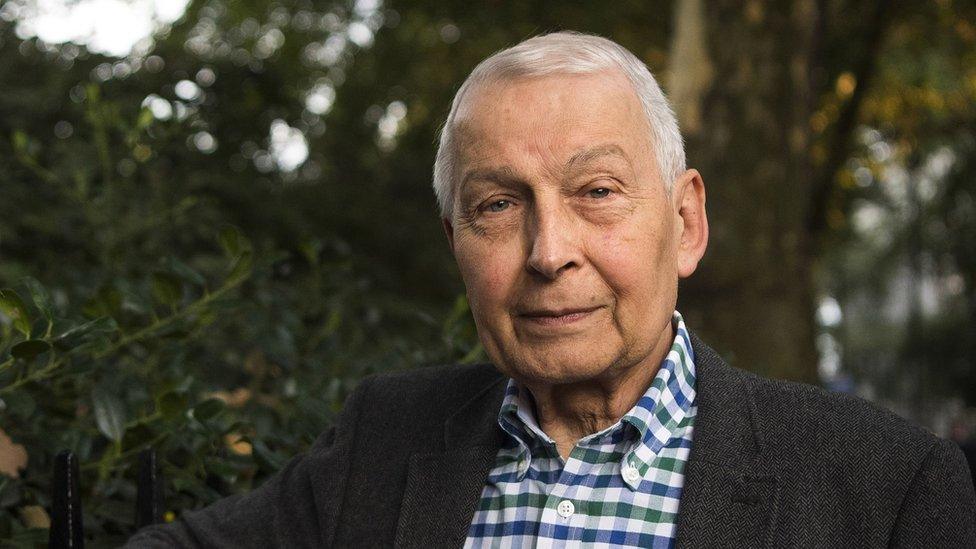
- Published30 August 2018
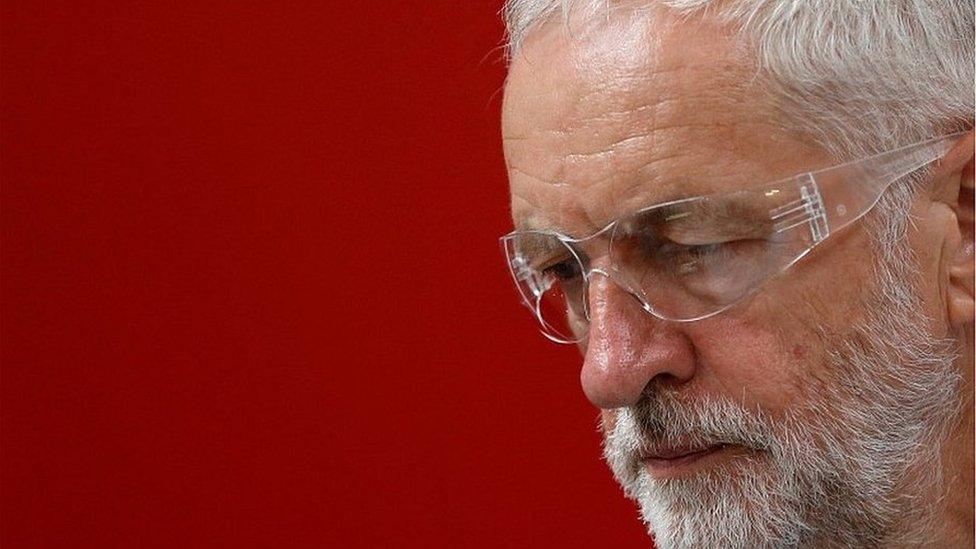
- Published11 September 2018
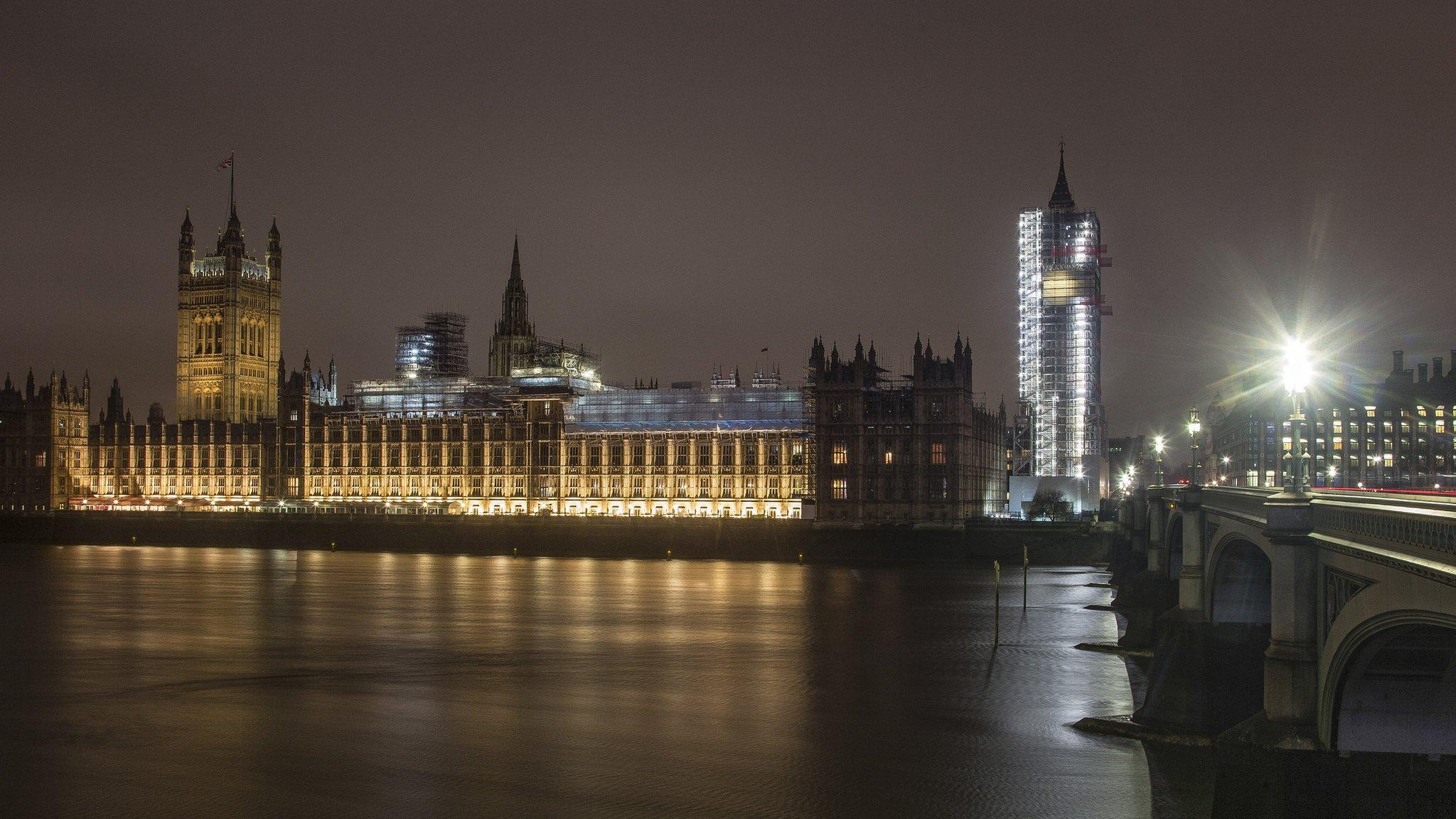
- Published18 July 2018
